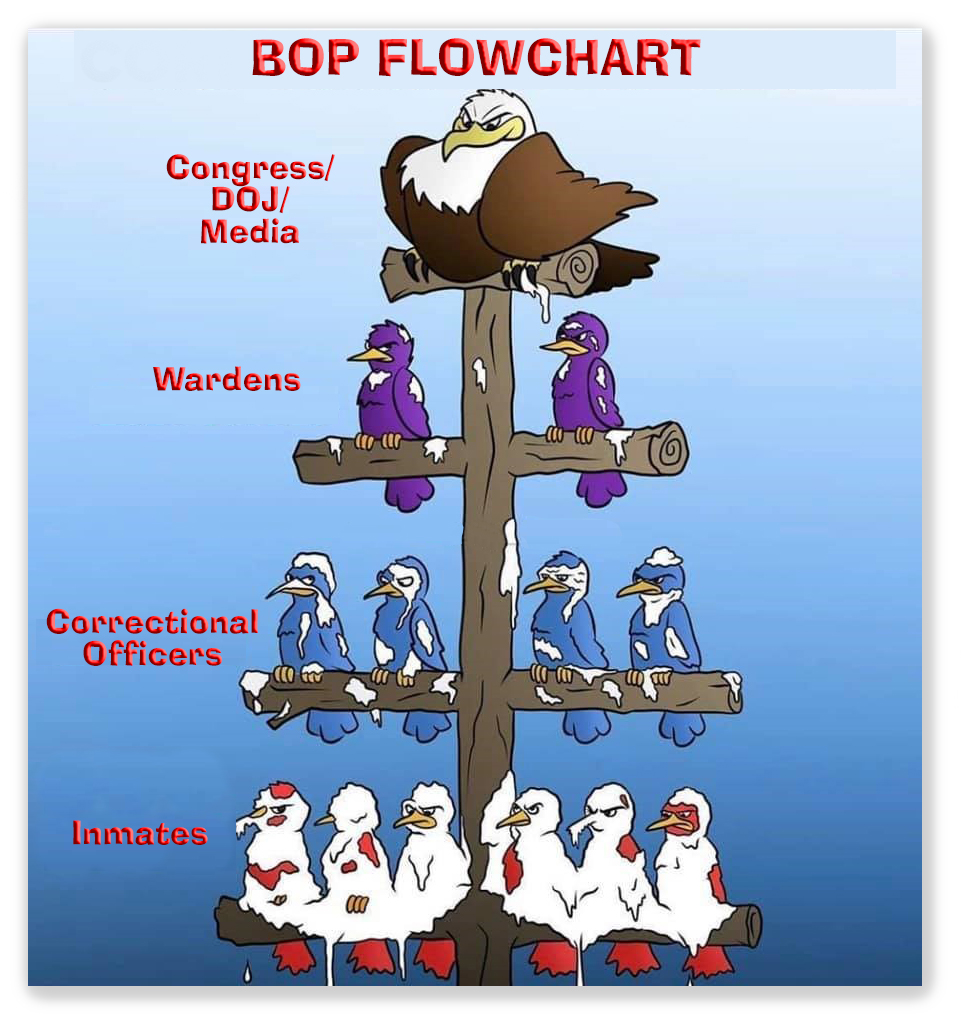We post news and comment on federal criminal justice issues, focused primarily on trial and post-conviction matters, legislative initiatives, and sentencing issues.

YOU AIN’T SEEN NUTHIN’ YET
A mere nine days ago, I recounted that Bureau of Prisons Director Michael Carvajal had just ended a lousy week. Turned out it was just a dress rehearsal for what was to come.
First, last week the Dept. of Justice Inspector General issued a report criticizing the BOP’s lack of security at camps, after “multiple investigations involving prison escapes, including an investigation at the Federal Correctional Complex (FCC), SPC, Beaumont, Texas, where the escape of 4 inmates went undetected for more than 12 hours despite 3 overnight inmate counts during that period of time.” The IG conceded that the correctional officers “likely complied with BOP and FCC Beaumont policy when conducting the nighttime counts,” but cited “security concerns that enabled the inmates’ escape.”
 But before inmates and their families experience too much schadenfreude, consider this: The BOP says it has tightened up on security at the Beaumont camp (including the addition of a fence, the absence of which had always been a big selling point for camps. The IG report suggests that changes being made in Beaumont camp security be applied to all BOP camps, meaning that things should be getting tighter for campers everywhere. What is it again that rolls downhill?
But before inmates and their families experience too much schadenfreude, consider this: The BOP says it has tightened up on security at the Beaumont camp (including the addition of a fence, the absence of which had always been a big selling point for camps. The IG report suggests that changes being made in Beaumont camp security be applied to all BOP camps, meaning that things should be getting tighter for campers everywhere. What is it again that rolls downhill?
The report’s timing was poor, given that two weeks before, the BOP had trumpeted to Congress in a budget request that it “maintains institution security through a combination of sound correctional practices, highly trained staff, technology, and careful classification of inmates.” Oh yeah? Ask those inmates sleeping in their bunks over there… or are those just mannequins?
The IG report was followed by a Washington Post story a day later that “Federal prison inmates are keeping large sums of money — in some cases more than $100,000 each — in government-run deposit accounts effectively shielded from court orders for things like child support, alimony or other debts, and not subject to the same scrutiny as accounts owned by non-incarcerated citizens…”
 This is a non-story to federal prisoners or their families, who keep Western Union afloat by paying exorbitant rates to send money into inmate trust accounts. The Post described inmate trust accounts with a breathlessness reserved for a Trump Administration expose, as though the Inmate Trust Fund program is a perk that inmates are lucky enough to have and regularly abuse. According to the story, over 20 inmate accounts hold an average of $150,000, and the combined value of all inmate accounts is over $100 million. For math whizzes, this works out to about $660.00 per inmate, not exactly a down payment on a Rolls Royce.
This is a non-story to federal prisoners or their families, who keep Western Union afloat by paying exorbitant rates to send money into inmate trust accounts. The Post described inmate trust accounts with a breathlessness reserved for a Trump Administration expose, as though the Inmate Trust Fund program is a perk that inmates are lucky enough to have and regularly abuse. According to the story, over 20 inmate accounts hold an average of $150,000, and the combined value of all inmate accounts is over $100 million. For math whizzes, this works out to about $660.00 per inmate, not exactly a down payment on a Rolls Royce.
The problem, the Post says, is that Inmate Trust Accounts have “long frustrated and angered law enforcement officials from other agencies, who say it poses significant risks for abuse, money laundering and corruption.” The BOP, according to the paper, “has for years resisted efforts to change it because its leaders maintain they are already diligent about making inmates pay what they owe.”
A week ago today, Senate Judiciary Committee Chairman Richard Durbin (D-Illinois) expressed shock at the Post report and said he and Sen Charles Grassley (R-Iowa) would be writing to Carvajal demanding to know more about the accounts.
More stuff rolling downhill toward prisoners… Inmates now can count on the BOP being pressured by Congress to seize their money for all manner of debts other than just restitution and fines.
 Finally, the US Sentencing Commission and BOP numbers released last week are not going to make Durbin and Grassley, who are both critics of the BOP’s chary approach to granting compassionate release requests, any happier with Carvajal. While the prior BOP director approved a measly 55 out of 1,735 compassionate release requests in 2019 (.03%) – Carvajal has OK’d two orders of magnitude fewer: 36 requests out of 31,000 in the 13 months since the pandemic took hold in March 2020 (0.001%).
Finally, the US Sentencing Commission and BOP numbers released last week are not going to make Durbin and Grassley, who are both critics of the BOP’s chary approach to granting compassionate release requests, any happier with Carvajal. While the prior BOP director approved a measly 55 out of 1,735 compassionate release requests in 2019 (.03%) – Carvajal has OK’d two orders of magnitude fewer: 36 requests out of 31,000 in the 13 months since the pandemic took hold in March 2020 (0.001%).
By comparison, federal judges approved 21% of compassionate release requests they considered in 2020, according to a US Sentencing Commission report released last week.
DOJ Inspector General, Notification of Security Concerns at the Federal Bureau of Prisons Camp Locations (June 8, 2021)
Los Angeles Times, 29 prisoners have escaped from federal lockups in the last 18 months (June 11, 2021)
Washington Post, Federal prisoners hold $100 million in government-run accounts, shielded from some criminal scrutiny and debt collection (June 9, 2021)
Government Executive, Budget Request for Federal Prisons Agency Isn’t Enough, Union Says (June 9, 2021)
US Sentencing Commission, Compassionate Release Data Report – 2020 (June 10, 2021)
Law360.com, Fed. Prisoners See Limited Success In Pandemic Release Bids (June 11, 2021)
– Thomas L. Root

